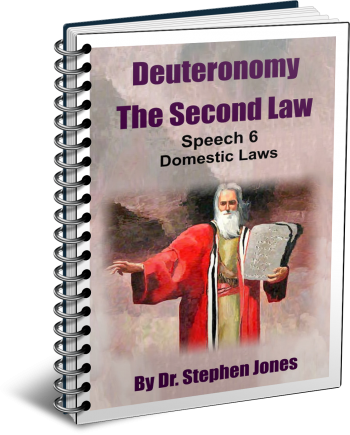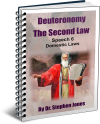Latest Posts
View the latest posts in an easy-to-read list format, with filtering options.

A commentary on the sixth speech of Moses in Deuteronomy 21-23. The book of Deuteronomy is a series of 12 speeches that Moses gave just before his death at the end of Israel's wilderness journey.
Category - Bible Commentaries

Moses says in Deuteronomy 22:4,
4 You shall not see your countryman’s donkey or his ox fallen down on the way, and pay no attention to them; you shall certainly help him to raise them up.
This is a practical law that shows God’s concern not only for mankind, but also for the animals that He has created. We may extend this law to ban all cruelty to animals. God claims the right to regulate our behavior toward animals on the grounds of His creative rights. In Lev. 25:23 God claims eminent domain over the land, and we see from Deut. 22:4 that this applies to animals, too. In fact, we have a very clear statement of God’s claim in Jer. 27:5 and 6,
5 I have made the earth, the man and the beasts which are on the face of the earth by My great power and by My outstretched arm, and I will give it to the one who is pleasing in My sight. 6 And now I have given all these lands into the hand of Nebuchadnezzar king of Babylon, My servant, and I have given him also the wild animals of the field to serve him.
And so, because God created and owns all the animals as well as mankind, no man has the right to mistreat anything that God has created. This includes people, for all were made of the dust of the ground, which God created. Loving your neighbor as yourself is a law that is rooted in the fact that God created all men and therefore owns them. If it is unlawful to mistreat a donkey, then it is certainly unlawful to mistreat any human being.
Jesus commented directly on Deut. 22:4 in Matt. 23:2-4, when He told His disciples,
2 saying, “The scribes and the Pharisees have seated themselves in the chair of Moses; 3 therefore all that they tell you, do and observe, but do not do according to their deeds; for they say things and do not do them. 4 And they tie up heavy loads and lay them on men’s shoulders; but they themselves are unwilling to move them with so much as a finger.
In other words, they were like men who would pile huge loads upon their donkeys, but when they fall under the load, they are unwilling to lift a finger to help them. In other words, they were following the traditions of men which had actually put away the law. Matt. 15:3 says,
3 And He answered and said to them, “And why do you yourselves transgress the commandment of God for the sake of your tradition?
After giving examples, Jesus concludes in verse 9,
9 But in vain do they worship Me, teaching as doctrines the precepts of men.
On another occasion Jesus appealed to the law, after being criticized for healing a man on the Sabbath. He told his critics in Luke 14:5,
5 … Which one of you shall have a son [Greek: huios, “son”] or an ox fall into a well, and will not immediately pull him out on a Sabbath day?
Even the Pharisees understood that they could not leave their son—or even an animal—in a well until the Sabbath had passed. Here the son and the ox are treated by the same principle of law. The principle held true with healing people on the Sabbath. Sabbath laws were given for our benefit, but when men treat Sabbath laws as if they were a rigid rule, the whole spirit of the law might easily be violated.
For this reason Jesus healed on the Sabbath. It was done to give rest and relief to the sick, so that they too might truly enjoy the Sabbath.
Earlier, in Luke 13:15, 16, Jesus faced similar opposition after healing a woman who had been bound by sickness for eighteen years. The head of the synagogue was indignant and quoted the Sabbath law to Jesus, insisting that He had six days in which to heal, but He ought to rest on the seventh.
15 But the Lord answered him and said, “You hypocrites, does not each of you on the Sabbath untie his ox or his donkey from the stall, and lead him away to water him? 16 And this woman, a daughter of Abraham as she is, whom Satan has bound for eighteen long years, should she not have been released from this bond on the Sabbath day?”
In this example Jesus used the example of “his ox or his donkey,” because these are the animals which might be untied and led to water on the Sabbath. But His point was that if we are not to leave animals tied up in the stall on the Sabbath, then how much more important was it to untie this woman who had been tied up for eighteen years?
Luke found this incident particularly interesting, because he was a doctor. His entire gospel was about bringing therapy and healing to the victims of injustice, caused by men’s misunderstanding and misapplication of the law. Luke was Paul’s companion, doctor, and scribe for many years during his missionary journeys. Luke learned from Paul a deeper understanding of the law than he had known previously; and Paul learned from Luke a deeper appreciation for the equality that the ethnos enjoyed in the sight of God, as well as how to express and apply the law to Greek culture.
My friend Mark Eaton, who has studied Greek for many years, wrote this to me about the book of Luke:
“I personally believe the book of Luke is about the Promise and the fulfillment, the basis of Redemption in the Law that is expressed as the Justice of God is expressed in the Healing and medical language of Luke in Greek…. No one could share the nature and function of the Law to a Greek mind better than Paul and Luke, together as a team. The book of Luke reveals the Healing for the heart and mind that comes from the tainted Justice that was directly opposed to the Law.”
The example of the woman bound eighteen years is unique with the book of Luke, as the other gospels make no mention of her. No doubt he found that law to be particularly applicable to his own medical profession.
In fact, Luke’s wording in 14:5 linked the son to the ox. I detect some humor in this, much like when Benjamin Franklin wrote: “Fish and visitors smell in three days,” or again, “Only editors and people with tapeworms have the right to use the editorial ‘we’.” Linking two things draws a direct parallel between them in a humorous way. So also Jesus showed a humorous side when He brought up the law in terms of “a son or an ox.”
We see, therefore, how Jesus applied the law to the “daughter of Abraham” (Luke 13:16), and to “a son or an ox” (Luke 14:5), even though the law was expressed only in terms of animals in Deuteronomy 22:4. The occasion for expounding on this law came through the Sabbath law, which applied to both animals and people. Deuteronomy 5:14 says, “in it you shall not do any work, you or your son… or your ox or your donkey.”
The law about mistreating animals, in its literal surface meaning, applies to donkeys and oxen in a practical sense. Its spiritual intent broadens the application to include people. We may take this a step further and see also its prophetic meaning, where donkeys are Pentecostals and oxen are Overcomers. (See my book, The Wheat and Asses of Pentecost.)
Applying the law on this level shows that we are not to mistreat any of God’s servants: Pentecostals or Overcomers. If they are trapped in certain situations or bound by beliefs that we believe are untrue, we are commanded in the law to be concerned for them and do what we can to set them free. Having said that, it should also be made clear that we should not try too hard, lest we attempt to force someone to believe some truth that they are not ready to hear. If a donkey falls into a pit, we cannot set him free if he is content to remain there. He must be dissatisfied with his current condition in order to change.
In Matthew 21 we read how Jesus’ “Triumphal Entry into Jerusalem” was on a donkey and its colt. He had obtained these by sending two disciples to “untie them and bring them to Me” (21:2). Why was it important that this donkey have a colt? I believe it prophesied of two comings of Christ, as the colt suggests a future time when we would see this scene repeated in some way.
Jesus came the first time to die on the cross and to prepare the way for the promise to be fulfilled on the day of Pentecost. That explains the presence of the mother donkey. But the colt speaks of our own time in the latter days. In the second work of Christ, He will untie the colt of Pentecost in a greater way. On one level it speaks of the great outpouring of the Holy Spirit that is yet to come. On another level it speaks of releasing the Church under Pentecost into a greater understanding of the word so that Pentecost itself is no longer a leavened feast (Lev. 23:17).
Technically speaking, the Pentecostal offering (our heart) is leavened, and so it must be baked by the Holy Spirit and with fire in order to kill the leaven and make it fit for God’s communion table.
When we are able to understand and compare all three levels of understanding the word—the literal, the spiritual, and the prophetic—then we can begin to grasp the mind of Christ as expressed in the law.